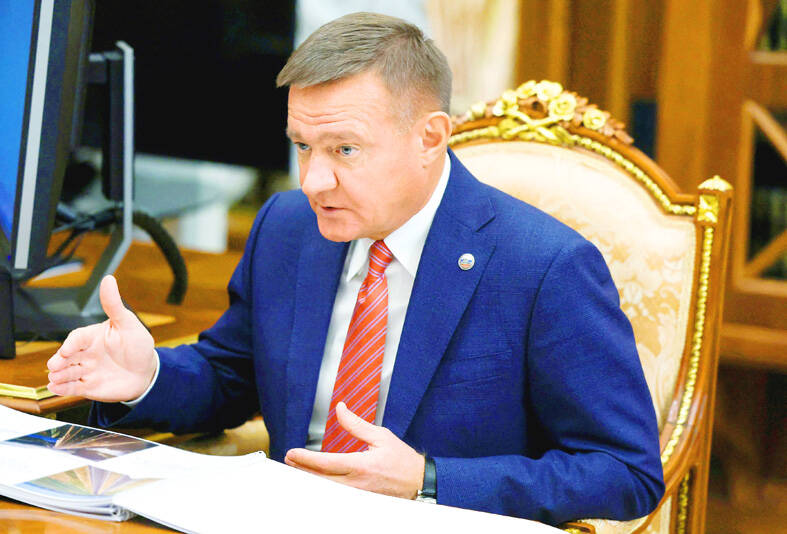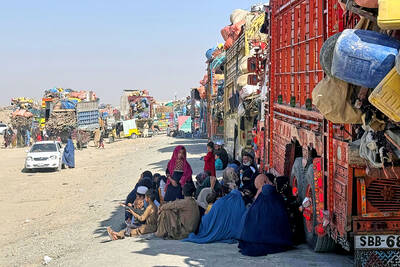Russia’s transport minister was found dead from a gunshot wound in an apparent suicide, investigators said on Monday — news that broke hours after the Kremlin announced that he had been dismissed by Russian President Vladimir Putin.
The Kremlin did not give a reason for the firing of Russian Minister of Transport Roman Starovoit and it was unclear when exactly he died and whether it was related to an investigation into alleged corruption, as some Russian media suggested.
The Russian Investigative Committee, the top criminal investigation agency, said the body of Starovoit, 53, was found with a gunshot wound in his car parked in Odintsovo, a neighborhood just west of the capital where many members of Russia’s elite live. A gun previously presented to him as an official gift was reportedly found next to his body.

Photo: Sputnik / Gavriil Grigorov via Reuters
A criminal probe was launched into the death and investigators saw suicide as the most likely cause, according to committee spokesperson Svetlana Petrenko, who did not say when Starovoit died.
Law enforcement agents were seen carrying Starovoit’s body from the site on Monday evening.
Andrei Kartapolov, a former deputy defense minister who heads a defense committee in the lower house of parliament, told news outlet RTVI that Starovoit killed himself “quite a while ago,” and some Russian media alleged that he might have taken his life before the publication of Putin’s decree firing him.
Starovoit was last seen in public on Sunday morning, when an official video from the ministry’s situation room featured him receiving reports from officials.
Russian media have reported that Starovoit’s dismissal could have been linked to an investigation into the embezzlement of state funds allocated for building fortifications in the Kursk region, where he served as governor before becoming transportation minister.
The alleged embezzlement has been cited as one of the reasons for deficiencies in Russia’s defensive lines that failed to stem a surprise Ukrainian incursion in the region launched in August last year. In the stunning attack, Ukraine’s battle-hardened mechanized units quickly overwhelmed lightly armed Russian border guards and inexperienced army conscripts. Hundreds were taken prisoner.
The incursion was a humiliating blow to the Kremlin — the first time the nation’s territory was occupied by an invader since World War II.
The Russian military had announced that its troops had fully reclaimed the border territory in April — nearly nine months after losing chunks of the region.
Starovoit’s successor as Kursk governor, Alexei Smirnov, stepped down in December last year and was arrested on embezzlement charges in April. Some Russian media have alleged that Starovoit also could have faced charges as part of the investigation.
His dismissal also followed a weekend of travel chaos as Russian airports were forced to ground hundreds of flights due to Ukrainian drone attacks.
However, most commentators said that the air traffic disruptions have become customary amid frequent Ukrainian drone raids and were unlikely to have triggered his dismissal.
Shortly after Putin’s decree on Starovoit was published, Andrei Korneichuk, an official with a state railways agency under his ministry, collapsed and died during a business meeting, Russian news reports said.
They said that he died of an apparent heart attack.
An official order releasing Starovoit from his post was published on the Kremlin’s Web site on Monday morning without giving a reason for his dismissal.

With much pomp and circumstance, Cairo is today to inaugurate the long-awaited Grand Egyptian Museum (GEM), widely presented as the crowning jewel on authorities’ efforts to overhaul the country’s vital tourism industry. With a panoramic view of the Giza pyramids plateau, the museum houses thousands of artifacts spanning more than 5,000 years of Egyptian antiquity at a whopping cost of more than US$1 billion. More than two decades in the making, the ultra-modern museum anticipates 5 million visitors annually, with never-before-seen relics on display. In the run-up to the grand opening, Egyptian media and official statements have hailed the “historic moment,” describing the

‘CHILD PORNOGRAPHY’: The doll on Shein’s Web site measure about 80cm in height, and it was holding a teddy bear in a photo published by a daily newspaper France’s anti-fraud unit on Saturday said it had reported Asian e-commerce giant Shein (希音) for selling what it described as “sex dolls with a childlike appearance.” The French Directorate General for Competition, Consumer Affairs and Fraud Control (DGCCRF) said in a statement that the “description and categorization” of the items on Shein’s Web site “make it difficult to doubt the child pornography nature of the content.” Shortly after the statement, Shein announced that the dolls in question had been withdrawn from its platform and that it had launched an internal inquiry. On its Web site, Le Parisien daily published a

‘NO WORKABLE SOLUTION’: An official said Pakistan engaged in the spirit of peace, but Kabul continued its ‘unabated support to terrorists opposed to Pakistan’ Pakistan yesterday said that negotiations for a lasting truce with Afghanistan had “failed to bring about a workable solution,” warning that it would take steps to protect its people. Pakistan and Afghanistan have been holding negotiations in Istanbul, Turkey, aimed at securing peace after the South Asian neighbors’ deadliest border clashes in years. The violence, which killed more than 70 people and wounded hundreds, erupted following explosions in Kabul on Oct. 9 that the Taliban authorities blamed on Pakistan. “Regrettably, the Afghan side gave no assurances, kept deviating from the core issue and resorted to blame game, deflection and ruses,” Pakistani Minister of

UNCERTAIN TOLLS: Images on social media showed small protests that escalated, with reports of police shooting live rounds as polling stations were targeted Tanzania yesterday was on lockdown with a communications blackout, a day after elections turned into violent chaos with unconfirmed reports of many dead. Tanzanian President Samia Suluhu Hassan had sought to solidify her position and silence criticism within her party in the virtually uncontested polls, with the main challengers either jailed or disqualified. In the run-up, rights groups condemned a “wave of terror” in the east African nation, which has seen a string of high-profile abductions that ramped up in the final days. A heavy security presence on Wednesday failed to deter hundreds protesting in economic hub Dar es Salaam and elsewhere, some